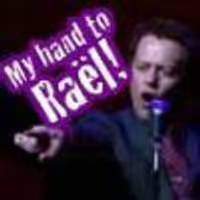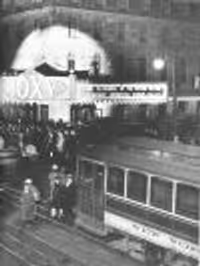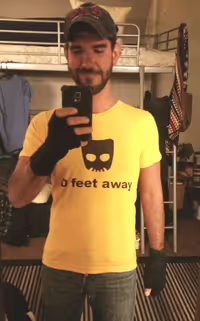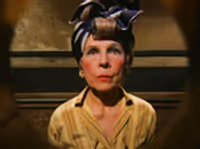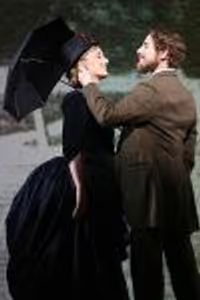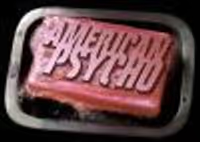What is so bad about bootlegs?
#275What is so bad about bootlegs?
Posted: 7/18/14 at 12:06pmWhat's with people who think that non-commercial video recording equipment hasn't improved since the Zapruder tape?
#276What is so bad about bootlegs?
Posted: 7/18/14 at 12:15pmI always wonder how the taper can keep his hand up and steady for over an hour or so.
FutureGM
Chorus Member Joined: 11/19/13
#277What is so bad about bootlegs?
Posted: 7/18/14 at 12:16pm
It does not excuse the fact that you are recording someone without their consent. There are professional recordings of performances (RENT, Shrek, Oklahoma!, etc.) that went through all the requirements in order for future generations to enjoy that particular production. Also, all those involved were properly compensated as per union contracts.
I also never said all the actors and musicians; I said "a great number" (just check out their twitters these days). I never doubted there would be some that wouldn't mind. (I am sitting here now with a Broadway actor, asked him about it and he agrees with me and he knows several others who would as well)
I don't doubt these will continue to happen; it just the era we live in. However, it does not stop them from being illegal and highly disrespectful to those actors and musicians who do mind.
AEA AGMA SM
Broadway Legend Joined: 8/13/09
#278What is so bad about bootlegs?
Posted: 7/18/14 at 12:19pm
I think I've said before (don't feel like going through all the pages of this to see what I've said), but for every actor who does seek out bootlegs you will always have those who don't. I have never had a company that didn't have actors who are quick to alert stage management when they catch somebody photographing/filming/recording and want us to get house management to not only stop them but make sure they delete what they've done.
I also find it amusing that one actor I know and have worked who has a somewhat sizable collection of bootlegs is the first to complain if he feels he doesn't get enough notice from management when official photographers or videographers are coming to rehearsal.
Personally, I turn a blind eye to the traders (though get very frustrated by those who will demand money), but will indeed do what I can to stop bootleggers on shows I'm working on, since it is my job, after all, and out of respect and courtesy for all the creatives (production, artistic, and cast members) who do not want their work to be recorded without their consent.
#279What is so bad about bootlegs?
Posted: 7/18/14 at 12:38pm
@ FutureGM - I never said that you said ALL- only pointing out that there are MANY and let me stress this MANY actors that come to me looking for them.
- I think those that are trying to fight them are fighting a losing battle- especially when it comes to Broadway shows- You just can't stop it most of the time- most shows now a days will get filmed at some point- wither it be video or audio.
#280What is so bad about bootlegs?
Posted: 7/18/14 at 12:50pm
Truly, I doubt that bootlegs have much of an effect at all on a show’s income. If anything, I think it can only help.
I’ve never watched a bootleg INSTEAD of seeing a show – any bootlegs I’ve seen of shows that I haven’t already seen live are not shows I was ever planning on buying a ticket for. At least this way, some of those shows have proved me wrong in what I expected and, when I watch a bootleg of a show I end up liking, all I want is to get a ticket to see it live. If I didn’t like it, I was never going to risk spending ticket money on it anyway (at least seeing a show through bootlegs gives the show an opportunity to make me a fan, which could result in buying a ticket that I would never have bought before seeing the bootleg).
I truly believe that the majority of people who watch/get bootlegs get them either because they saw the show and loved it and want documentation of it to watch in the future or, for whatever reason, they are unable to see the performance. And, for those people who are unable to get to NYC to see a show, bootlegs provide a way for shows to gain fans they otherwise would not have had. This can result in good word-of-mouth and more sales of merchandise. I think it can only expand shows’ fanbases, personally. I really think that it is only a very, very small percentage of people who will get a bootleg instead of seeing a show and I highly doubt those people are making much difference in sales figures.
I, too, am interested in how bootlegs pre-the mini and phone cameras were done. Was it all through hiding those large cameras in a backpack? Considering everything they had going against them, the quality of some of them is quite impressive.
#281What is so bad about bootlegs?
Posted: 7/18/14 at 12:55pm
The main reason i have them is because they are great training for me- I put one on and learn the entire chorography of a show or the part of a certain character, acting along with the TV.
-They also help me when i am in a regional production of a show because i learn visually and by doing- i learn my lines faster this way then just reading them over and over.
#282What is so bad about bootlegs?
Posted: 7/18/14 at 1:02pm
My problem is that I just look weird in them. I favor straight- or wide-legs.
#283What is so bad about bootlegs?
Posted: 7/18/14 at 1:06pm
I, too, am interested in how bootlegs pre-the mini and phone cameras were done. Was it all through hiding those large cameras in a backpack? Considering everything they had going against them, the quality of some of them is quite impressive.
Take into account that some of those recordings may have been "inside jobs".
#284What is so bad about bootlegs?
Posted: 7/18/14 at 2:38pmPardon me if this has been mentioned already (I haven't read the whole thread recently), but it seems like most of the discussion is around video bootlegs, while probably most of the bootlegs recorded nowadays seem to be audios. Obviously there are still lots of video bootlegs too, but audios are so much easier to record and distribute that they might account for a larger majority of bootlegs recorded. I personally believe that it's harder to argue a case against audio bootlegs. While they are still illegal, they are not at all obtrusive or distracting to the actor, nor does it cause the person recording it much stress as I imagine videos do. And I think audios are even less likely than videos to harm the show's sales (though I don't believe any bootlegs do that).
#285What is so bad about bootlegs?
Posted: 7/18/14 at 4:13pmThanks Maddie for your explanation and Darreyl the copies I see are sent to a friend from his source in NYC and they are all very bad with great shots of the ceiling and the audience shoulders and out of focus.
#286What is so bad about bootlegs?
Posted: 7/18/14 at 4:53pm
Tell your friend to get a new source.
I am actually a very prominent trader with a huge collection that I trade out- so I speak from a place of knowledge When it comes to bootlegs. Tell your friend he is getting ripped off.
#287What is so bad about bootlegs?
Posted: 7/18/14 at 5:00pmHow do you solve a problem like show bootlegs?
StephanCasey
Stand-by Joined: 6/22/14
#288What is so bad about bootlegs?
Posted: 7/18/14 at 5:09pmlmao @themysteriousgrowl. Yeah lol. I don't know what kind of guy thinks bootleg jeans look good #Blegh
#289What is so bad about bootlegs?
Posted: 7/18/14 at 6:09pm
I have a bootleg of Roza and that was years and years ago. It had to be one of the first ones done
Georgia Brown had a song in the show which brought down the house in gut wrenching fashion.
I will be seeing more via the bootleg route going forward so I am glad they are available.
#290What is so bad about bootlegs?
Posted: 7/18/14 at 9:02pm
Most anything people would want to watch is available here:
http://www.nypl.org/locations/lpa/theatre-film-and-tape-archive
Correct?
Does anyone know what the requirements are for a production to be recorded and stored here? Does it have to be nominated for a certain amount of awards or something?
Looks like they are also in progress of transferring everything to DVD.
Updated On: 7/18/14 at 09:02 PM
Jon
Broadway Legend Joined: 2/20/04
#291What is so bad about bootlegs?
Posted: 7/18/14 at 10:16pm
Pretty much any show on Broadway (and many Off-Broadway)that runs more than a week gets videotaped for the Lincoln Center library. If they are not, it's usually because the show closed quickly without much advance warning, making it impossible to set up the taping.
I recall attending the closing performance of an Off-Broadway show. They were taping if for the Lincoln Center archives that night. The show was supposed to be an open-ended run, and they had not originally scheduled the taping for that night. When the producers decided to close (lack of ticket sales), they scheduled the taping. In the case of some long-running hits, the tapes are of replacement casts. Once you know the show is going to run a year or more, there's no big hurry to get it on tape.
ghostlight2
Broadway Legend Joined: 12/5/04
#292What is so bad about bootlegs?
Posted: 7/18/14 at 10:30pm
"Pretty much any show on Broadway (and many Off-Broadway)that runs more than a week gets videotaped for the Lincoln Center library"
This isn't even close to true.
#293What is so bad about bootlegs?
Posted: 7/18/14 at 11:22pmThey started recording things for the LCL archives around the 1970s, yes?
#295What is so bad about bootlegs?
Posted: 7/18/14 at 11:30pm
Thanks, Jordan.
Have you watched anything there? If so, what?
#296What is so bad about bootlegs?
Posted: 7/18/14 at 11:34pmI've watched a ton of shows there, doing hours of research.
#297What is so bad about bootlegs?
Posted: 7/18/14 at 11:42pm
Any that stand out?
Glad it's extensive.
nolegrl88
Swing Joined: 6/13/14
#298What is so bad about bootlegs?
Posted: 7/19/14 at 9:23pmI don't see how bootlegs can harm sales. They cannot replace seeing a live performance as most of them are not shot well. I wish they would just release professional video and soundboard recordings of the shows and people could get them at the end of the show.
felipenor
Understudy Joined: 11/23/13
#299What is so bad about bootlegs?
Posted: 7/19/14 at 10:53pm
The thing is, the general public doesn't really care for these bootlegs so I guess it's mostly Broadway fans who watch them, and I don't think any of those fans has refrained from watching a live musical in favor of a bootleg. Both can coexist, just like they have so far.
To be honest, I still don't understand why more musicals aren't released for actual purchase, like they did with Rent, Shrek or Sweeney Todd.
Videos


